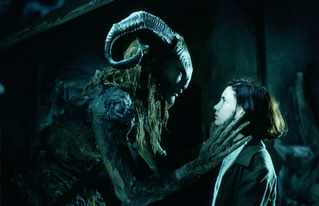
“Pan’s Labyrinth” is several movies rolled into one. It is a political thriller, a fantasy tale for adults, and more. The New York Times film critic A. O. Scott sums it up: “Pan's Labyrinth is a political fable in the guise of a fairy tale. Or maybe it's the other way around.”
The movie is set in rural Spain of 1944, where the young Ofelia and her recently remarried, pregnant mother move into her step-father’s house. Ofelia lands in the middle of an army camp where her step-father is the captain of a regiment of the fascist army fighting the populist rebellion.
Ofelia has a lot to put up with- the war-induced turmoil around her, her mother’s pregnancy-induced sickness and depression, the pure-evil, control-freak step-father among other things. Life at the army camp has few respites for Ofelia, barring the sympathetic maid and her books, which offer fantastic tales and never-ending diversions.
As soon as she arrives at the army camp, she discovers a fairy, and is guided to a hidden world in the woods, which is filled with legends, fauns, fairies, monsters, and a portal to another world. She is guided by a faun, who may or may not be trusted, in her quest to enter the other world through the portal.
Her quests involve several classic challenges common in the fairy-tale world, where the brave, beleaguered protagonist is faced with tough choices, tempted to transgress the rules, and comes out victorious in the end after going through a true test of character. But these scenes are executed with great flourish and a wonder-filled approach that underlies the magic-fairy genre.
Interweaved with this is the tale of the unfolding political turmoil in Spain, and the battle between the army and the guerilla forces. In this war, the loyalty and courage of several of the characters are tested.
Then there is the use of violence. As much as the fairy-tale part is filled with a child-like innocence, the war/political struggle part is filled with gut-wrenching, graphic violence that will make Rambo look like a shy second grader. This makes for a curious combination. By doing this, the filmmakers reach for completely different parts of the emotional-palette and paint a complex, engrossing, and ultimately satisfying picture.
The actors bring this complex, always shifting tale to life. Such stories need strong villains, and Sergei Lopez provides the movie with a three-dimensional tyrant, and fills every bit of the screen with menace and hate. Three cheers to the director Guillermo del Toro (“Hell Boy”, “Cronos”) for conceiving and bringing this seamless, fantastic film to life.